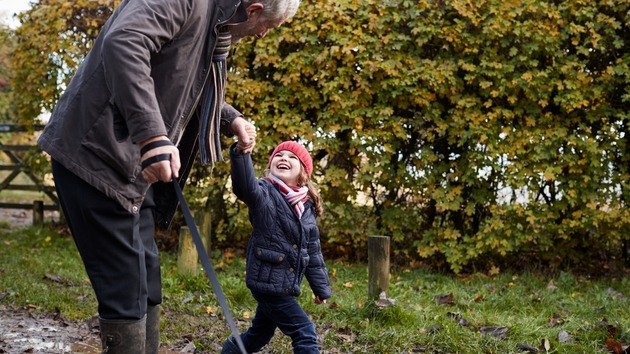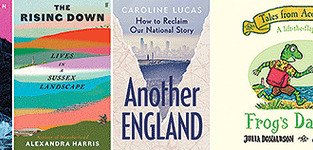Get vaccinated to protect yourself and your community.
November 10th, 2020 I’m Dr Lucy McLaughlin, a Steyning resident and mum of two young children. As part of my job in healthcare communications, I am involved in vaccine advocacy programs, analysing data and working hard to get the message across to the public that vaccines are one of the most important public health interventions of all time, greatly reducing rates of disability and disease, saving approximately 2−3 million lives each year. Because of this, national vaccination programs are a key fixture in public health systems, and their performance (vaccination coverage in a population) is considered an indicator of how well a health system is functioning.
I’m Dr Lucy McLaughlin, a Steyning resident and mum of two young children. As part of my job in healthcare communications, I am involved in vaccine advocacy programs, analysing data and working hard to get the message across to the public that vaccines are one of the most important public health interventions of all time, greatly reducing rates of disability and disease, saving approximately 2−3 million lives each year. Because of this, national vaccination programs are a key fixture in public health systems, and their performance (vaccination coverage in a population) is considered an indicator of how well a health system is functioning.Despite compelling evidence of the value of vaccines, vaccine hesitancy ─the voluntary refusal or delay of recommended vaccines despite their availability─ is a growing concern, and according to the World Health Organization, is one of the top 10 threats to global health. Whether or not people accept vaccines is not a polarized issue with people being either “for” or “against” them, instead it occupies a vast range between total refusal and total acceptance, can be context specific (for example, people may accept some vaccines in some situations, but refuse others in other situations), and may be influenced by factors such as complacency (“I don’t think I need the vaccine”), convenience (“I haven’t got time to go and have a vaccine”), and confidence (“I generally believe in vaccines, but I have concerns about…”). Many people who are hesitant have genuine concerns that need addressing, but often do not speak up for fear of being labelled “anti-vax.” Now more than ever, with a handful of very good, safe Covid-19 vaccines approaching the end of their clinical trials and ready for rollout, understanding and overcoming the reasons for hesitancy is paramount, and begins with allowing people the space to voice their concerns.
Vaccines are one of the safest medicines around.
Vaccines are given to millions of healthy people — including children — and are therefore held to the highest safety standards of any medicine. Vaccines are tested on thousands of participants in clinical trials to determine whether they are safe, what dose works best, and how the immune system reacts. Every batch is tested to ensure that it is safe, pure, and sterile. Independent regulatory agencies review all test results and regularly inspect factories where vaccines are made to ensure that every dose of vaccine meets standards for both quality and safety, which scrupulously continues for as long as the vaccine is licensed and recommended. There is no evidence linking vaccines to autoimmune diseases, asthma, chronic seizure disorders, child developmental disorders, learning or developmental disorders, or attention deficit or disruptive disorders. And despite no evidence of any harm, the preservative thimerosal (mercury) has been removed from all childhood vaccines since 2001. Concerns about elements such as aluminum in vaccines are unfounded, because these elements appear in traces that are far smaller than naturally occur in the body, and in far smaller amounts than in breast and formula milk. Vaccines really are the safest, and most regulated medicines of all. With the spotlight on Covid-19 vaccines, and an honesty-first approach, vaccine manufacturers are being totally transparent about all their findings, which is why they make headline news, and the public gets to know what is going on in real-time instead of several months later.
Covid-19 vaccines have not been developed too quickly.
Lessons learned from previous pandemics have allowed scientists to be more prepared and respond more efficiently to Covid-19 without compromising the safety and quality of clinical trials. Preparing for a pandemic like this has been the life’s work of many research labs around the world. The genetic sequence of the virus became available at the end of last year and a vaccine was designed by the beginning of January. By capitalizing on knowledge about other similar viral diseases like SARS, and using vaccine technology that they knew from experience works and is safe, teams were able to progress quickly with vaccine development, months before the World Health Organization declared a pandemic in March. Furthermore, a rate-limiting factor in many clinical trials, the time taken to recruit enough participants to test a medicine, happened at incredible speed for Covid-19 vaccine trials, aided by social media drives and volunteers who understood what was at stake. Other clinical trial time lags were minimised by leveraging emergency provisions, and the otherwise time-draining logistics and administration of building and manufacturing facilities to produce billions of vaccine doses have been greatly reduced by an unprecedented global effort. And let’s not forget that the research and development teams, and doctors and nurses overseeing the trials, have been working around the clock – weekends and evenings – to bring a vaccine to us in record time via high quality clinical trials.
Vaccinations are not just a personal matter.
Many vaccine-preventable diseases have declined to such low levels (the rates of diphtheria, polio, mumps, pertussis, and several other diseases have decreased by more than 90% compared with the pre-vaccination era), that vaccines have become a victim of their own success because many people are not aware of the threat that these diseases posed to previous generations. They may not be aware that the viruses and bacteria that caused the diseases are still around and can be transmitted by people who are not protected against them (with the exception of smallpox, which was completely eradicated by vaccination). Recent outbreaks of measles show how gaps in vaccination coverage can allow low levels of a highly contagious disease to spread quickly in a community and cause harm.
There is, of course, the matter of freedom of choice. However, if you were to decide you don’t need a vaccine because you are fit and healthy and would likely be okay if you were to become infected with Covid-19, you could still pass the infection to others, such as those undergoing cancer treatment. Your decision then ceases to become a personal matter. Furthermore, the devastation wreaked by this disease doesn’t just take the form of hospitalization and death. We are only beginning to understand “long Covid,” whereby people who have knowingly or unknowingly been infected suffer debilitating symptoms weeks, months, and possibly years after infection, even if they were not ill enough to go to hospital and managed their recovery at home. Evidence suggests that in the long term, Covid-19 can detrimentally affect younger and fitter age groups with no underlying health conditions ─ it is not just a disease that affects the elderly or those with poorer health. Prevention is always better than cure.
Beware your sources of information.
People with questions about vaccines often turn to the Internet, where fact or fiction may be difficult to discern. We are living in an infodemic, with an overabundance of information, which can include deliberate attempts to disseminate wrong information (for example, unsubstantiated safety concerns presented as scientific information) that undermines the public health response. In our hyper-connected world, often the information that thrives and survives may not be the best or wisest ─ people tend to engage with and remember stories that interest them, rather than stories that are factually correct. Check your sources when you read anything about vaccines on the Internet. Check that the information is credible. Please think before you re-post, like, share, or comment on a post. In my job, everything we communicate undergoes several rounds of strict, independent, legal, and medical review to ensure that it is accurate, peer-reviewed, balanced, and fair. Everything that I have written here can be substantiated by sources such as the World Health Organization, the Centers for Disease Control and Prevention, and other institutes that do not have an agenda other than optimising the health of the global population.
So…vaccines work. But they only work if enough people in a community are vaccinated so that the infamous R number reduces to below 1, which kills transmission. Your actions protect not only yourself, but your loved ones and your community, too. If optimum coverage is not reached, R remains above 1 and the virus continues to rule our way of life. The consensus of many of the world’s top immunologists with whom I have consulted is that the only clear way out of the pandemic is if the vast majority of people are vaccinated against Covid-19. Through vaccine uptake, lives will be saved, and the quality of life for most will improve so that, along with lessons learned this past year, we can move towards a new, improved, kinder, and unrestricted normal, for ourselves and for our children. I can’t wait for that.
Vaccines are one of the safest medicines around.
Vaccines are given to millions of healthy people — including children — and are therefore held to the highest safety standards of any medicine. Vaccines are tested on thousands of participants in clinical trials to determine whether they are safe, what dose works best, and how the immune system reacts. Every batch is tested to ensure that it is safe, pure, and sterile. Independent regulatory agencies review all test results and regularly inspect factories where vaccines are made to ensure that every dose of vaccine meets standards for both quality and safety, which scrupulously continues for as long as the vaccine is licensed and recommended. There is no evidence linking vaccines to autoimmune diseases, asthma, chronic seizure disorders, child developmental disorders, learning or developmental disorders, or attention deficit or disruptive disorders. And despite no evidence of any harm, the preservative thimerosal (mercury) has been removed from all childhood vaccines since 2001. Concerns about elements such as aluminum in vaccines are unfounded, because these elements appear in traces that are far smaller than naturally occur in the body, and in far smaller amounts than in breast and formula milk. Vaccines really are the safest, and most regulated medicines of all. With the spotlight on Covid-19 vaccines, and an honesty-first approach, vaccine manufacturers are being totally transparent about all their findings, which is why they make headline news, and the public gets to know what is going on in real-time instead of several months later.
Covid-19 vaccines have not been developed too quickly.
Lessons learned from previous pandemics have allowed scientists to be more prepared and respond more efficiently to Covid-19 without compromising the safety and quality of clinical trials. Preparing for a pandemic like this has been the life’s work of many research labs around the world. The genetic sequence of the virus became available at the end of last year and a vaccine was designed by the beginning of January. By capitalizing on knowledge about other similar viral diseases like SARS, and using vaccine technology that they knew from experience works and is safe, teams were able to progress quickly with vaccine development, months before the World Health Organization declared a pandemic in March. Furthermore, a rate-limiting factor in many clinical trials, the time taken to recruit enough participants to test a medicine, happened at incredible speed for Covid-19 vaccine trials, aided by social media drives and volunteers who understood what was at stake. Other clinical trial time lags were minimised by leveraging emergency provisions, and the otherwise time-draining logistics and administration of building and manufacturing facilities to produce billions of vaccine doses have been greatly reduced by an unprecedented global effort. And let’s not forget that the research and development teams, and doctors and nurses overseeing the trials, have been working around the clock – weekends and evenings – to bring a vaccine to us in record time via high quality clinical trials.
Vaccinations are not just a personal matter.
Many vaccine-preventable diseases have declined to such low levels (the rates of diphtheria, polio, mumps, pertussis, and several other diseases have decreased by more than 90% compared with the pre-vaccination era), that vaccines have become a victim of their own success because many people are not aware of the threat that these diseases posed to previous generations. They may not be aware that the viruses and bacteria that caused the diseases are still around and can be transmitted by people who are not protected against them (with the exception of smallpox, which was completely eradicated by vaccination). Recent outbreaks of measles show how gaps in vaccination coverage can allow low levels of a highly contagious disease to spread quickly in a community and cause harm.
There is, of course, the matter of freedom of choice. However, if you were to decide you don’t need a vaccine because you are fit and healthy and would likely be okay if you were to become infected with Covid-19, you could still pass the infection to others, such as those undergoing cancer treatment. Your decision then ceases to become a personal matter. Furthermore, the devastation wreaked by this disease doesn’t just take the form of hospitalization and death. We are only beginning to understand “long Covid,” whereby people who have knowingly or unknowingly been infected suffer debilitating symptoms weeks, months, and possibly years after infection, even if they were not ill enough to go to hospital and managed their recovery at home. Evidence suggests that in the long term, Covid-19 can detrimentally affect younger and fitter age groups with no underlying health conditions ─ it is not just a disease that affects the elderly or those with poorer health. Prevention is always better than cure.
Beware your sources of information.
People with questions about vaccines often turn to the Internet, where fact or fiction may be difficult to discern. We are living in an infodemic, with an overabundance of information, which can include deliberate attempts to disseminate wrong information (for example, unsubstantiated safety concerns presented as scientific information) that undermines the public health response. In our hyper-connected world, often the information that thrives and survives may not be the best or wisest ─ people tend to engage with and remember stories that interest them, rather than stories that are factually correct. Check your sources when you read anything about vaccines on the Internet. Check that the information is credible. Please think before you re-post, like, share, or comment on a post. In my job, everything we communicate undergoes several rounds of strict, independent, legal, and medical review to ensure that it is accurate, peer-reviewed, balanced, and fair. Everything that I have written here can be substantiated by sources such as the World Health Organization, the Centers for Disease Control and Prevention, and other institutes that do not have an agenda other than optimising the health of the global population.
So…vaccines work. But they only work if enough people in a community are vaccinated so that the infamous R number reduces to below 1, which kills transmission. Your actions protect not only yourself, but your loved ones and your community, too. If optimum coverage is not reached, R remains above 1 and the virus continues to rule our way of life. The consensus of many of the world’s top immunologists with whom I have consulted is that the only clear way out of the pandemic is if the vast majority of people are vaccinated against Covid-19. Through vaccine uptake, lives will be saved, and the quality of life for most will improve so that, along with lessons learned this past year, we can move towards a new, improved, kinder, and unrestricted normal, for ourselves and for our children. I can’t wait for that.
Comments (0)
No comments have been submitted yet.Why not be the first to send us your thoughts
Leave A Comment
Thank you for your comments, they will appear shortly once approved.
Recent Posts
Have You Seen...






